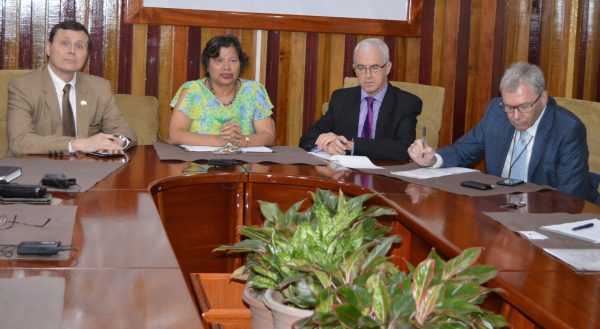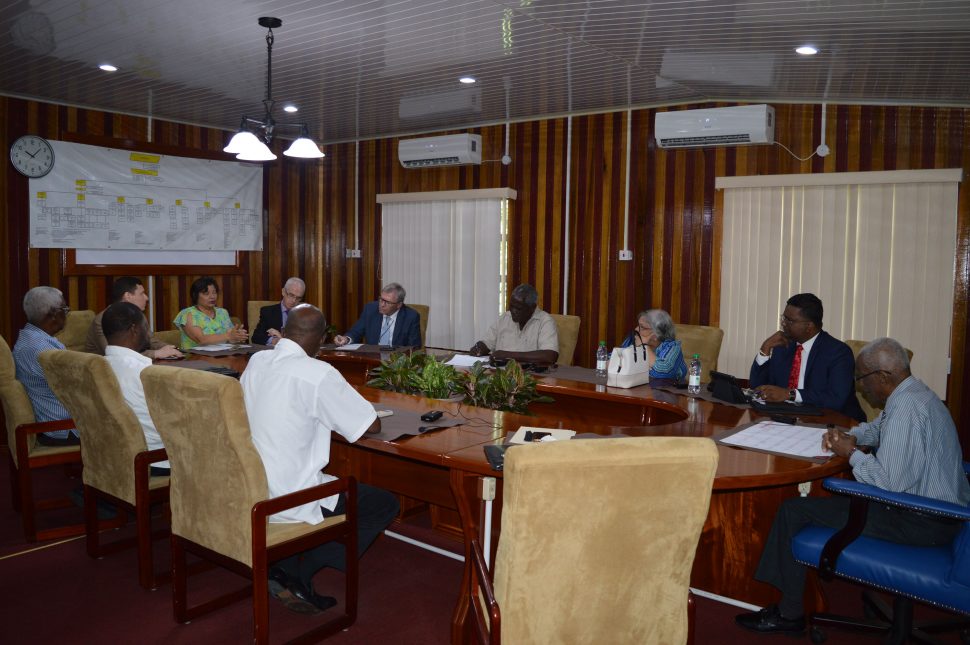Representatives of the American, British, Canadian and European Union missions here met yesterday with the Guyana Elections Commission (GECOM) on poll preparations and a concern was raised about the impact the current political situation could have on foreign investment.
“There was a comment which said: I just want to make you all aware of the fact that the state of things could be affecting inward investment,” government-nominated Commissioner Vincent Alexander told reporters following the meeting.
According to PPP/C-nominated Commissioner Sase Gunraj, this recognition of the “impact of the current impasse” should also be shared by Guyanese. “It is a recognition that the longer this continues, it affects their [Guyanese] livelihood and the commitments this country makes,” Gunraj explained.

The seven-member Commission met with the diplomatic representatives for more than two hours at GECOM’s Kingston headquarters, where they were questioned about GECOM’s preparedness to hold general and regional elections. The meeting was held at the request of the diplomatic missions.
Present at the meeting were United States Deputy Chief-of-Mission Terry Steers Gonzales; High Commissioner of Canada Lilian Chatterjee; Deputy High Commissioner of the United Kingdom Ray Davidson and Deputy Head of the European Union Delegation Philippe Coessens.
“We informed them of the issues touching on holding of elections and the delays that are being thrown up, including the latest thing on funding,” Gunraj told reporters.
With polls constitutionally due in a month’s time due to a vote of no-confidence against the government, GECOM, by majority decisions, determined on Tuesday that it will advise President David Granger that the 90-day constitutional deadline for general elections cannot be met and will continue with its approved work plan for the year, including a national house-to-house registration process.
The decisions were based on advice received from the Ministry of Finance, which noted that the approved annual budget of a constitutional agency, such as GECOM, shall not be altered without the approval of the National Assembly. It also took into consideration a 148-day timeline for the holding of elections provided by Chief Election Officer Keith Lowenfield.
According to PPP/C nominated commissioner Bibi Shadick, the questions asked by the diplomats were “very insightful and will help.”
Echoing the complaints by the opposition PPP/C, both Gunraj and Shadick accused government of holding the Constitution hostage and stymying the work of GECOM.
They also revealed that three months after the allocation of $5.37 billion for the commission’s 2019 work programme, the money has not been disbursed.
Reminding that Section 80B (8) of the Fiscal Management and Accountability (Amend-ment) Act, No. 4 of 2015, makes clear that “the appropriation of a constitutional agency approved by the National Assembly shall be disbursed as a lump sum by the end of the month, following the month in which the appropriation was approved,” Shadick said a failure to disburse the funds is a direct attempt to stymie the Commission.
She also argued that contrary to advice given by Finance Secretary Michael Joseph, the commission does not need to return to Parliament for a new budgetary allocation to hold elections. “I don’t know that we need to go back to Parliament. The law is clear. GECOM’S funds are a lump sum subvention to this agency drawn directly from the Consolidated Fund after which nobody has to amend- amend being add or subtract- except Parliament. Nobody is asking to add or subtract. The money should be at our disposal,” she added.
Gunraj, too, reiterated that the position taken on funding is tantamount to the withholding of funding from the commission.
Setting a date
Speaking with reporters after the meeting with the diplomats, Alexander maintained that what is required of the commission is to report on its state of preparedness, which it has done.
“To accuse GECOM of flying in the face of the Constitution is to not understand its role,” he said, while adding that GECOM does not set an election date but instead responds to a set election date.
“Article 106(7) does not provide for GECOM to automatically begin preparing for elections outside of an order from the President. The President has to give a date for elections and that is what GECOM has to work with because there are statutory dates leading up to that date and you can’t determine those dates without an order,” Alexander further stated.
Asked if President Granger can, therefore, ignore GECOM’s decision that it cannot hold elections by the end of March as dictated by the Constitution, Alexander noted that legally he is not obliged to follow GECOM’s decisions but certainly, in the spirit of the Constitution and any logical framework as well as based on precedent set, he is likely to.
However, Attorney General Basil Williams on Wednesday declared that the president cannot fix a date for elections without consulting with the commission. “If the president were to, without consultation with GECOM as to its readiness fix a date for elections… when the elections date approaches [and] GECOM then says ‘we won’t be able to make this date,’ what happens? The Constitution caters for that,” he said, before adding that Article 162 gives GECOM the power to postpone elections. “So there is no way you could talk about fixing an elections or conducting an elections unless you deal with GECOM. GECOM is the only body that has jurisdiction to conduct elections in Guyana,” he said. Pressed on the responsibility of GECOM to hold elections in keeping with the Constitution, he maintained that Article 106 has to be read subject to Article 162. “GECOM, under the Constitution, is not subject to the direction or control of any other person. GECOM is totally independent… So the government does direct GECOM. We can’t,” he said. Williams further maintained that given the ruling of acting Chief Justice Roxane George-Wiltshire, no funds can be made available to hold an elections since there is no Cabinet in place.
“Only the Cabinet could recommend and consent to financial bills going to the Parliament for passage,” he said, before adding that government and the opposition cannot, therefore, go back to Parliament to get funding.
Asked how government would get money to function after the three months expire, he noted that each ministry has an approved budget that they can work with, before he stressed that the three months expiring “doesn’t mean anything.” Williams said the naysayers are trying to frighten the population into believing that if the three months expire without polls then there is no government.
“This is not so. When we look at the Chief Justice’s decision, she said no less than five times that the president and the government remain [and] the government resigns after the president is sworn in after an election,” he pointed out.
“There will be no interregnum [or] situation where the country is without a government. We are the government and the president remains president until elections are held and another president is sworn in…,” he said.
In light of his explanation, he was asked to explain the value of asking the Appeal Court to grant a stay on the judgments upholding the validity of the motion. In response he said, “We believe that the court should grant a stay [and] preserve the status quo ante so that there is no question of three months running. There is no issue,” he maintained.





